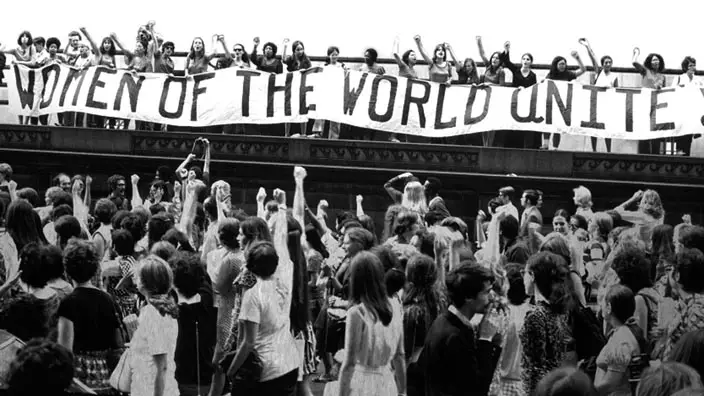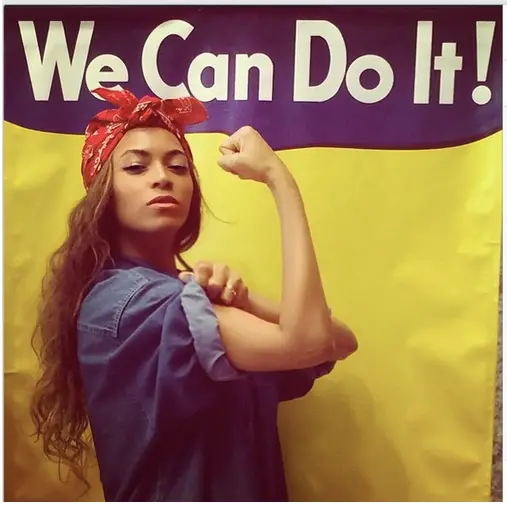The Why Chromosome
Despite going to a woman-centered college, I’ve been disappointed to find that the hashtag version of feminism has become the norm.
By Sofia Rivera, Simmons College
Young people spend a lot of time trying on other people’s identities and wearing them as their own, only to discover their parent’s politics are a pair of too-tight pants and their grandparents’ religion itches like a wool sweater.
Shopping for identities that fit and shedding ones that don’t is how young adults create their own set of beliefs, which also means that they’re susceptible to suggestions and influence. At least, I know I am.
I have my own opinions on a variety of subjects and am largely confident making my own decisions, but in many ways, I’m still figuring out what I believe, which involves a lot of peeling off of labels that have been stuck on me and putting on my own.
So when I started attending a woman-centered college—that is, a college where anyone can apply as long as they are not a cis man (someone whose sex is male that identifies as the male gender)— I quickly wrote down “feminism” and stuck it to myself. At a woman-centered college, where estrogen levels are high and everyone’s hoping desperately for equal pay so their expensive degrees can be worth as much as their brothers’ and boyfriends’, calling myself a feminist was the easiest thing I could do.
I thought I was genuine. I could pick Susan B. Anthony out of a lineup and I knew to thank Gloria Steinem for Ms. Magazine, but a couple trivia facts does not a feminist make.
When I came home one weekend, my dad and I were in the car when he asked me what feminism was. I knew that he knew the definition, so the question felt like some kind of test. Frazzled, I tried to recall the quote from Beyonce’s “Flawless” (taken from Chimamanda Ngozi Adichie’s speech), but couldn’t recite it verbatim. I ended up mumbling something about equal rights, which felt like a stupidly simplistic answer.
Why didn’t I have a better response? One reason was the rising popularity of feminism. From being considered synonymous with “radical” and “man-hater” to becoming a popular hashtag, the sheer trendiness and commercialism of feminism has diluted the movement to little more than a T-shirt logo. But feminism shouldn’t be the extracurricular activity you claim to participate in on your college application but never actually attend the meetings of, because in the real world if no one shows up to the rally, nothing changes. Well-intentioned actions, like Emma Watson’s address to the UN introducing the HeForShe campaign that helped cater feminism toward men, made the movement’s actual definition more elusive, making it even easier to jump on the buzzword bandwagon.
Going to school surrounded by women, you might think I’d see beyond this vague semblance of feminism, but I didn’t, because of the other reason. While there are tons of very educated, eloquent, awesome women at my school, the overwhelming feminism is very vanilla. That is, not at all intersectional.
It is a small, liberal arts college, where a lot of the student body has lived in the same area for most of their lives and an even larger percentage is Caucasian. So one type of feminism is passionately, sometimes even aggressively promoted all throughout campus, but feminism isn’t one size fits all. When a student enters the college, they don’t leave behind every other identity they have besides their gender, and assuming that African American women, trans women and white, straight, cis women all experience the world in the same way won’t progress anything.
Declaring myself a feminist was really easy to do, since hardly anything changed—which is the problem. Actual feminism isn’t easy or cutely achieved by dressing up as Rosie the Riveter for Halloween or even by burning a bra. Being a feminist can mean, as it has in the past, being okay with people demonizing and demeaning you for your beliefs, protesting 20 times just to be heard once, and being heard 20 times just to effect some change. It’s a lot of hard work, without which women today wouldn’t be able to vote, have access to contraception, apply for a credit card, compete in the Boston Marathon or aspire to a laundry list of other rights.
And even today, nearly everyone has heard the statistic: women make 79 cents to a man’s dollar.
But that’s an average, and when the figure is broken down by different factors, such as race, the numbers are even more unsettling. Latina woman earn an average of 54 percent for the same work by their male coworkers, African American women earn 63 percent and white women still earn only 78 percent, according to a 2014 survey. Sure, figures may have changed in the past two years, but it seems unlikely because the same study says that at the current rate, women won’t achieve equal pay for another 100 years.
So, yeah, we still need feminism. But if I’m being honest, we don’t need all feminism.
Some strains of pro-women ideology actually do more damage than they do progress, and when I first zealously declared myself a feminist I think I was one of those unhelpful feminists. My “This is what a feminist looks like” shirt would probably have looked more like a Donald Trump shirt, because I didn’t really know what I was doing or talking about, and I was hoping no one would call me out on it.
Now, I feel more comfortable and genuine calling myself a feminist, because I’ve taken time to understand what it means to me. I inform myself by reading about feminism; I talk about it with other women of different backgrounds; I ask men what they think about it; I write down questions I’m still unable to answer. I still cross my legs at the ankles on the metro rather than “manspreading,” and I was a black cat instead of Rosie the Riveter last Halloween, but that doesn’t have anything to do with my feminism.



















Ironically, Feminists try everything to get “Feminism” to appeal to men and it just doesn’t, because Men aren’t stupid and know when someone is pissing on their backs and telling them it’s raining. Part of the resistance is in the name– “FEM-inism”, which in no small way drives home the point that Feminism is for *women*. Even as women claim Men can be Feminists too, men simply do not agree. One obvious point is how Feminists have gone out of their way time and again to demonize men for pretty much everything that has ever befallen a woman, insisting that Men and men alone are responsible for the state of society and the resultant situation of women.
Another point is how Feminists have sued male-oriented institutions into practical oblivion in their zeal to tear down Men, Masculinity and anything related to the “Male” essence. Telling us that men are “creepy”, “rapey”, “cannot be trusted with children”, “oppressive”, “domineering”, “abusive” and the list goes on and on and on.
Feminists claim that the mention of “Fem” in the word “Feminism” shouldn’t be off-putting to men, even as they have called out, lobbied, shamed, and even sued to have any word containing the letters “Man” in it, such as “Fireman”, “Policeman”, “Rifleman”, “Chairman”, etc. changed to more “gender-inclusive” form such as “Fire Person”, etc. And yet, these self-same thin-skinned hateful Feminists harpies don’t see any issue with the word “Fem” being a prominent and pronounced portion of an ideology which purports to be about “gender equality”.
Furthermore, Feminists claim they do not hate men, and yet there is absolutely no evidence to back up their assertion. The library is full of books containing hateful denouncements of men, hateful rhetoric aimed at men, and hateful attitudes and beliefs about men. Feminists routinely excoriate men both publicly, online, in books and media, and even in general entertainment. For people who claim to love men so much- I say PROVE IT.
Show me all of the Feminist love songs for men. Show me all of the Feminist love sonnets for men. Show me all of the great Feminist novels extolling the virtues of men. Show me all of the great Feminist quotes expressing heartfelt love and equanimity and kindness and goodwill for men. Show me all of the Feminist books and articles which sing men’s praises and give thanks or even simple acknowledgment to their many accomplishments. Show me the vast cadre of Feminists toiling away building things, making things, inventing things to make Men’s lives a little easier, or a little better.
Feminists don’t do anything for men– ever. Unless it somehow benefits Feminists *more*, first and foremost. The only thing that Feminists have for men is the back of their hand and their denouncements and slander and ugly vilification– the constant daily sludge of “Women Good, Men Bad” which oozes out of every media orifice.
In contrast, Men work their asses off for Women. They work to feed them, clothe them, give them shelter and all of the comforts of civilization that they can possibly dream up and afford. Men help women in their daily lives. The build things, move things, create things, they provide companionship and protection and resources for their children.
Since the dawn of time Men have written countless works giving praise to women, wherein they are held up as “special” and “good” and “righteous”– virtues to which men themselves vow to aspire, women are granted automatically. Men honor women for their accomplishments and achievements, and just for being women. Men have sung millions of love songs to women expressing their faithfulness and undying love. Men sing the praises of their women. They hold them up and encourage them to grow and become all that they can be and do. Men even tear each other down at the behest of women, in their eagerness to please and provide what women say they want– even when it isn’t them (the Men).
Men have beaten back the savage wilderness, farmed the land, tamed the beasts, built the roads, built the towns and villages and cities. Men have created and invented nearly all of the great labor-saving devices throughout history. Men invented commerce, laws, education. Men defend their countries and their women with their blood. Sacrificing themselves on the battlefield, often dying miserable deaths in faraway places in the hope that their women and families can continue on.
So what are the ways that Feminists express their love for men? They yell at men. Scream at men. Spit on men. Lambaste men in every conceivable manner from “The Patriarchy” to “Man-Splaining” to “Man-Spreading” to who knows what all else. They accuse men of being “oppressors” and of “hating women”. They tell men they’re creepy, “rapey”, can’t be trusted around children, call them monsters and baby-killers (odd really, considering the number of abortions they have carried out). The demean men, belittle men, slander men, and generally castigate men for anything and everything that pops into their heads– essentially for the crime of “being male”. They tell men that they should be castrated, “reduced to 90% of the population”, put onto “reservations” and “checked out like books”. They show men on TV to be stupid, bumbling, ineffectual, infantile, and incompetent compared to women.
And the list of Feminist “love” just goes on and on and on. To say nothing of all the wonderful quotes they have left us with, such as “I think man-hating is an honorable and viable political act”, or “all men are rapists and that’s all they are”, and “who cares how men feel or what they do or whether they suffer”. And most especially this gem “Women have always been the primary victims of war. Women lose their husbands, their fathers, their sons in combat.” And there are so many more “loving” sentiments to choose from, it’s hard to pick just one. Oh, and I almost forgot the best sentiment of all– Feminists have declared their independence from men “A woman needs a man like a fish needs a bicycle”.
You forget that YOU are just one half of the world. The OTHER half gets to understand things, think about things, decide about things, and respond to things too– that would be US MEN. *WE* experience all your “Feminist Love” and know it first hand for what it really is– vile repugnant demonization and “othering”, with a shameless agenda of tearing down everything that is “Male” and “Masculine”. That’s why we empower our little GIRLS but not our little BOYS. Show me ANY little boy who has ever in his life “OPPRESSED” anybody. Just ONE little boy.
You can’t do it. Because Feminism is not about equality, it’s only ever about uplifting women at the expense of Men and relegating Men as second-class citizens in the society that THEY built. Men are sick and tired of your Feminist ditherings about this and that when it always comes down to the same thing– blame it on the MEN and the constant “Women Good, Man Bad” drumbeat.
I understand that women make some valuable contributions to society. But if you want to impress anybody that Feminism is about “Equality” instead of just female supremacy– let’s see you dig some ditches, lay some pipe, crawl around in the sewers, put up some insulation, lay some pavement, haul some dirt, dig some coal– or any of the hundreds of things that MEN do quietly every single day, without fanfare, without complaint, and without a SINGLE THANK YOU from any of the pampered WOMEN who benefit from their service.
Feminism is a HATE GROUP and Feminists are HATEFUL PEOPLE.
You want us to believe otherwise? **PROVE IT **
[…] Women’s Protest image from Study Break […]
[…] Women’s Protest image from Study Break […]